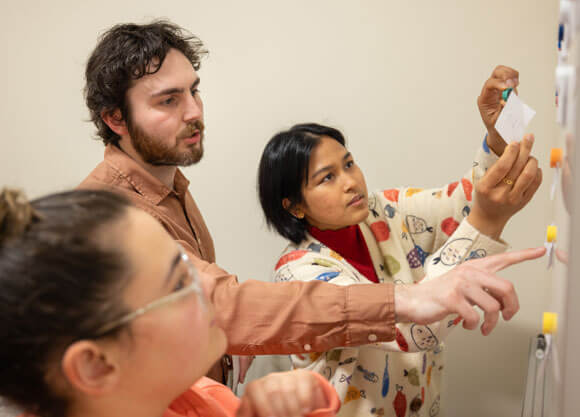
Escape room experience helps decode Medicare, Medicaid and health equity
April 10, 2025

April 10, 2025

The “Decoding Medicare, Medicaid and Health Equity: School of Medicine Escape Room Experience” was organized by Kriti Devkota, MD ’27, Lia Spencer, MD ‘28 and Rachel Schlak, MD ’27.
The Interprofessional Education (IPE) event held on April 3 on the North Haven Campus combined a lecture and hands-on experience to give participants a more complete view of medicine’s health systems, while also empowering them to assist future patients.
The student organizers said the informative, interactive, and interprofessional project aimed to fill a gap in medical education by using an escape room as a novel educational modality.
“We noticed that it was a big gap in our medical education curriculum,” said Spencer. “It’s something that comes up a lot during practice but that we don’t really discuss a lot during school. We think it’s really important, especially with programs like Medicaid and Medicare that cover so many people. They’re complex and the patients don’t always understand them fully.”
“As future physicians, we must be able to understand the health system that medicine exists within and be able to share this understanding with our patients, many of whom may be struggling to navigate the healthcare system,” said Devkota.
Supported by a grant from Quinnipiac’s Office of Inclusive Excellence, the unique hands-one experience drew a large mix of students from across Quinnipiac’s health provision disciplines.
“We’re hoping that it’s really fun and engaging and memorable, and that people will take this to their future practice and implement it. Hopefully we can help a lot of patients,” Schlak said.
Family Medicine Clerkship Director and Affiliated Clinical Medical Faculty Khuram Riaz Ghumman, MD, provided participants with an overview of state and federal health systems in medicine.
“Understanding the nuances of U.S. healthcare delivery systems and medical insurance is as essential for medical students as mastering anatomy and physiology—because delivering care means not only healing patients but also navigating the system that enables access to treatment,” said Ghumman.
Additionally, first-year Master of Social Work graduate student Sar Kass discussed the challenges faced by vulnerable individuals and families.
To practice hands-on applications of their new knowledge, teams of participants collaborated to solve escape room scenarios set up in the Standardized Patient and Assessment Center at Quinnipiac’s Frank H. Netter MD School of Medicine. Working together against the clock, they completed puzzles and brain teasers to assist patients in two different cases.
Physical therapy major Samantha Primavera, ’25 said it was a unique way to learn.
“These IPE events are always cool to come to because you learn things that you necessarily wouldn’t learn in class. It’s an extra learning experience that helps you gain an outside look of things that are really hard to grasp otherwise,” said Primavera.
Nursing student Caitriona Smith, BSN ’25, said the combined lecture and escape room experience was eye-opening.
“In nursing they always talk about how we need to use our social workers, and we need to understand how healthcare impacts our patients. I think this bridges the ‘how’ we’re going to do that for our patients,” said Smith. “I’m seeing the community side of taking care of patients and how it’s more than just stabilizing them in the hospital and sending them home. It definitely opened my eyes to a new perspective.”
Occupational therapy doctoral student Madison Cleary OTD ’25 said working with other professions in the escape room was an insightful experience.
“Being in the escape room together kind of forced us to understand different perspectives. I think it’s interesting to see how other people problem solve and learn those interprofessional skills as well,” said Cleary.
Kenneth Eichmann, OTD ’25 said the combination of having a better understanding of healthcare systems and collaborating with other disciplines was a powerful learning experience.
“From an occupational therapy standpoint, we might have our own tricks and tips of figuring out something like this, but getting the medical side or nursing side of things can allow you to think differently. Relying on your team, giving your perspective while also gaining their perspective, is really great in healthcare in general,” Eichmann said.
Medical students Anthony Tristani MD ’27 and Elizabeth Chernobelsky MD ‘27 said the experience was unique and impactful.
“I love these interprofessional education events because they allow you to make friendships with people from the other schools and really combine the knowledge you all require together in unique, different kinds of learning environments and synthesize something to really help the patient,” said Tristani. “It really helps to reaffirm that a care team consists of everyone, including the patient.”
Chernobelsky valued the opportunity to collaborate across disciplines.
“Working together as a team while actively learning is something that we don’t get to do on a day-to-day basis,” Chernobelsky said. “It’s also so interesting how we think that we know these things, and then you get into the nitty gritty and you realize there’s a lot more to it that we don’t understand, and it’s definitely important for us to understand as medical students.”
Quinnipiac Today is your source for what's happening throughout #BobcatNation. Sign up for our weekly email newsletter to be among the first to know about news, events and members of our Bobcat family who are making a positive difference in our world.
Sign Up Now